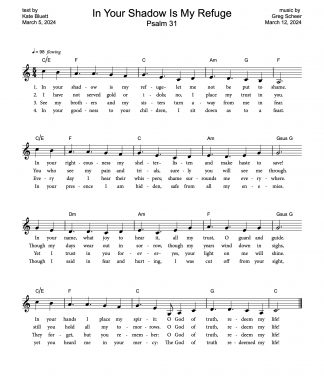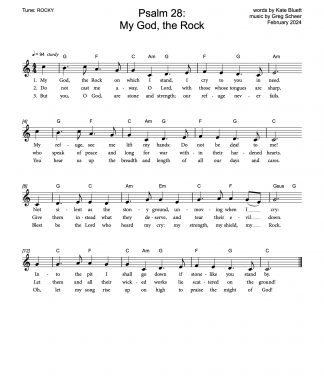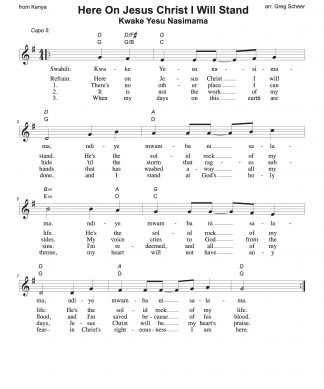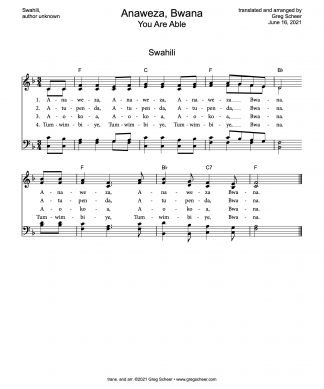
SYNOPSIS: Greg talks about spiritual practices, confession, and songs of devotion for use during the Lenten season.
EPISODE SECTIONS:
- 0:00 – Lenten spiritual practices
- 4:30 – Confession songs
- 8:44 – Songs about Christ-likeness
- 12:33 – “Jesus, Lord of Life and Glory” (choral arrangement by Greg)
RESOURCES MENTIONED IN THIS EPISODE:
- Contemporary Song: Purify My Heart
- Hymns: May the Mind of Christ, My Savior, I Surrender All, Jesus, Lord of Life and Glory
- Songs by Greg: May the Mind of Christ, My Savior, I Surrender All to You, Jesus, Lord of Life and Glory
- Video Tutorials: May the Mind of Christ, My Savior, I Surrender All to You
- Liturgical Resource: Confession Sequence with “Purify My Heart”
TRANSCRIPT
Hello, friends. This is Greg Scheer, and you are listening to the Greg Scheer Music Podcast.
So, we started last time a series on Lent, and we’re going to continue that. This week we’re going to look at some Lent devotion songs. So, one of the things that we do during Lent, is that we have extraordinary spiritual disciplines during the time of Lent. So you’ve probably heard of people, and this often is a Catholic thing, where people will give up candy for Lent. Or, you know, Diet Coke, those kinds of things. And all those things are great. So this is, these are supposed to be things that remind you of your devotion to Christ and draw you closer to Christ during the time of Lent.
“More…”So, you know, a person that is not very liturgical could just poo-poo the whole thing, and say, you know, “That’s just ridiculous. I love God all the time.” Well, and that’s true. I’m sure it is. But in the same way that you might take a vacation with your wife, and that is a way of, kind of, rekindling your love and your passion. In that same way, we do those kinds of things in our relationship with Christ.
So Lent is a time when we do that kind of thing. And people often give up something, because that kind of deprivation of whatever it is, it’s a, those things can often be crutches that you do to comfort yourself. So every time you’re feeling stressed, you, you know, eat those kinds of things. So when you give up your kind of go-to food or your go-to drink or whatever the thing you’re giving up, then it’s a way of reminding yourself that Christ is to be our all in all. And, I have done this on a number of years, and it’s just been a very, very powerful thing to go through a whole season thinking about this. And some people will go through the whole season having given something up, and then they will fast for three days at the end of Holy Week. And, I remember an Orthodox friend saying one time, because they cook these yeast breads on Sunday morning of Easter. He says when you walk into the church and you smell those breads wafting up from the kitchen, he says it’s like no smell you’ve ever encountered in your life, because you’re so hungry, you’re so ready to celebrate and to break your fast.
I think my favorite thing that someone gave up for Lent was recorded music. It was fantastic. She gave up listening to any recorded music during the whole season of Lent. And she said it not only changed her devotion to Christ but it also changed the way she listened to music. So she was so eager to go to even student recitals where they’re just playing, you know, songs that you’ve heard a thousand times. It was like a big deal because that was the only music that she was hearing. So really that Lenten discipline is really about being hungry and making sure that our hunger is for God.
So, what does this mean liturgically? So, well, I’ll tell you one thing that it means for me liturgically, what I do in worship. One of the things I really like to do during Lent is to sing a capella. And, in fact, The Hymn Society often encourages a Sunday which is an a capella Sunday. And the reason that we would do this is that we get so connected, so focused on all the bells and whistles of worship. We want a band, we want the organ, we want the choir, we want all this stuff, right? And if that isn’t there then we get all cranky. But, I think that there is a layer of entertainment that happens in worship, that isn’t necessarily bad in and of itself, but I think that we sometimes need to step back, take it away, and just kind of have the purity of an austere worship service, of just the voice, and having that carry it. And there’s just an austere beauty to just the voice singing. So I do a lot of a capella singing during Lent.
Another thing that you’ll find is that you often are going to beef up your confessions. So if you’re a church that does a confession each week, you will often, this will be a little bit oversized during Lent because it’s a time of penitence and discipline. So what kinds of things might you want to do during a confession? We talked last time about Psalm 51, and that’s a fantastic place to start.
There are plenty of songs. I’m just going to choose one to look at today, and it’s “Purify My Heart.” It’s by Jeff Nelson, and for copyright reasons I can’t do the whole song, but it goes like this:
Purify my heart.
Cleanse me with your holy fire.
You know, you get the idea, so it’s by Jeff Nelson. It’s called “Purify My Heart.” I really like that song. It’s kind of an old-school praise song, but because it’s a ballad I think it works well. It continues to hold up over time. One thing that I did recently is I wove together a confession with that song. I like to do this— fairly often I will have people sing their confessions. And, there are a number of reasons to do this. One, is because when you sing something it engages your emotions in it more than it would if you just recited it. And this is one of the big reasons that we sing is because it enflames our hearts and stirs up our passions, and when you combine that with God’s Word, then it brings a new level to our love of the Word and our love of God.
So, I like to have that. . . Oh, and then I was going to say the second reason. The second reason is that I like to reinforce the idea that music is just, not just music. It’s not just some kind of wallpaper, it’s not just people simply flapping their jaws because that’s what they do when they go to church. Everything that you do, all the music that you sing, that you play in church is doing something. It’s helping you confess. It’s helping you proclaim Scripture. It’s helping us respond to Scripture. You know, there are all sorts of things, but if you look at it, every single song that you do in a service is going to be doing something. It’s very important that we understand that.
So, one of the ways that I reinforce that, in our bulletin, it says, “Call to confession, Confession, Words of Assurance.” And so what I’ll do is I’ll let those titles stand, and then I’ll have a piece of music in, for example, the confession. So it’s bringing home the point that we’re not just singing a song, we’re confessing. And so in this particular case, the call to confession, for example, the pastor, the liturgist will stand up and say, “We seek to do good, but our wills are weak, our motives are mixed, and our hearts are impure. Let us return to our God, the refining fire, who will burn away the chaff of our lives, leaving only what is holy.”
Purify my heart. . .
And often, I will be, actually playing underneath this, just as a way of kind of binding it together. So, I’ll go to the words of assurance.
“People of God, the prayer of our hearts has been answered. Jesus Christ has died to forgive our sins, and rose again to give us new life. Our faith has made us whole. And let us live lives worthy of the grace we’ve been given.”
Purify my heart. . .
Now, I just completely butchered that. Sorry. But, you see what can happen then, is that the liturgist is speaking over this light guitar, and then the people come back in to sing. And it really creates a really good spirit in the room as we do this. So that’s confession.
Now let’s move on to some other things. Another thing that we’re thinking about during Lent, is, how do we conform ourselves to Christ? How do, the whole idea is that we’re walking with Christ through the latter part of his life. And we are walking, this journey is ultimately going to take us to the cross, and we know that in following Christ, we also follow him to the cross. And that’s, that’s one of the, we talk about Christ-likeness, and one of the ways that we achieve Christ-likeness is giving of ourselves, is in giving of our lives, is how we, part of how we imitate Christ.
So what kinds of songs work for that? I’ve got two in mind, and these are classic response songs. One is “May the Mind of Christ, My Savior,” and then the other is “I Surrender All.” Now, the original versions I’m sure you know:
May the mind of Christ my Savior
live in me from day to day.
I don’t have the music in front of me, so I’m not going to play it on guitar. And then “I Surrender All:”
I surrender all,
I surrender all,
I surrender all. . .
I’m butchering this. Sorry. You know that song. Well, I have two songs that I have written that are based on those songs, that, if you are kind of growing tired of using “May the Mind of Christ, My Savior” and “I Surrender All” as things that you can respond to, songs of dedication, then here are some possibilities. The first one, “May the Mind of Christ, My Savior,” goes like this:
May the mind of Christ, my Savior
live in me from day to day.
So, it kind of turns this song into kind of, more of a folk song. So, if you’re in a more contemporary church, this would be a really good option for you to do a song like “May the Mind of Christ, My Savior,” a song that really responds to the Word, and says, “Yes, I want to be like Christ, I want to conform to the image of Christ.” Now, I just created a YouTube video of that song. So not only will a link appear in the podcast episode description, you can go to YouTube, there will be a link on the podcast, too, and you can go to YouTube, and you can learn how to play that song, so you can learn this fancy lick. Because who doesn’t want to learn a lick like that?
Now, the other one is “I Surrender,” and my version is also a little bit more contemporary.
I surrender all to you.
So, you hear how it kind of. . . So you could do this with a praise band. You could do it with just solo guitar. And it’s a song of devotion. It could be done right after a sermon. It could be done at the very end of a service. And, this is a great way to send people out, is to have them dedicating their lives to Christ. I also made a YouTube video for this, “I Surrender All to You,” and you’ll find the link in the podcast episode description. And, so, and that just kind of unpacks how I play that. You can download the music from the website.
The final thing that we’ll talk about is a piece that I wrote, I took an existing hymn by James John Cummins, and it’s called “Jesus, Lord of Life and Glory,” and I’ll just sing the basic melody:
Jesus, Lord of life and glory,
Bend from heaven your gracious ear.
As we wait for you, adoring,
Friend of helpless sinners, hear:
By your mercy, oh, deliver us, good Lord.
By your mercy, oh, deliver us, good Lord.
So this one, once again, the music is at my website. And there are a couple different versions of this, I just want to make you aware. The reason that I think that this is an important song, kind of going back to the beginning of this podcast, where we’re talking about the sense of journey that goes along in Lent, this one goes through a number of verses, so it says, “From the depths of nature’s blindness, from the hardening power of sin,” and then it always says, “In your mercy, O deliver us, good Lord, in your mercy, O deliver us, good Lord.” And verse 3 is about temptations. Verse 4 is, “When the world around us is smiling,” it’s talking about when things are good and we begin to be lured away, “In your mercy, deliver us.” And then “In the weary hour of sickness, and at the time of dying,” so this is one that really covers the whole of life, and says, always comes back to, “By your mercy, deliver us, O Lord.” So it’s a really good one. I have a lead sheet and piano music at my website, and GIA Music publishes a choral anthem of this that I wrote. The choral anthem is G-8892, “Jesus, Lord of Life and Glory.”
So these are a number of resources that you can use, and a number of things to think about as you come into Lent. I really hope that this has opened up some good doors for you, and I look forward to continuing this next series in the near future.




